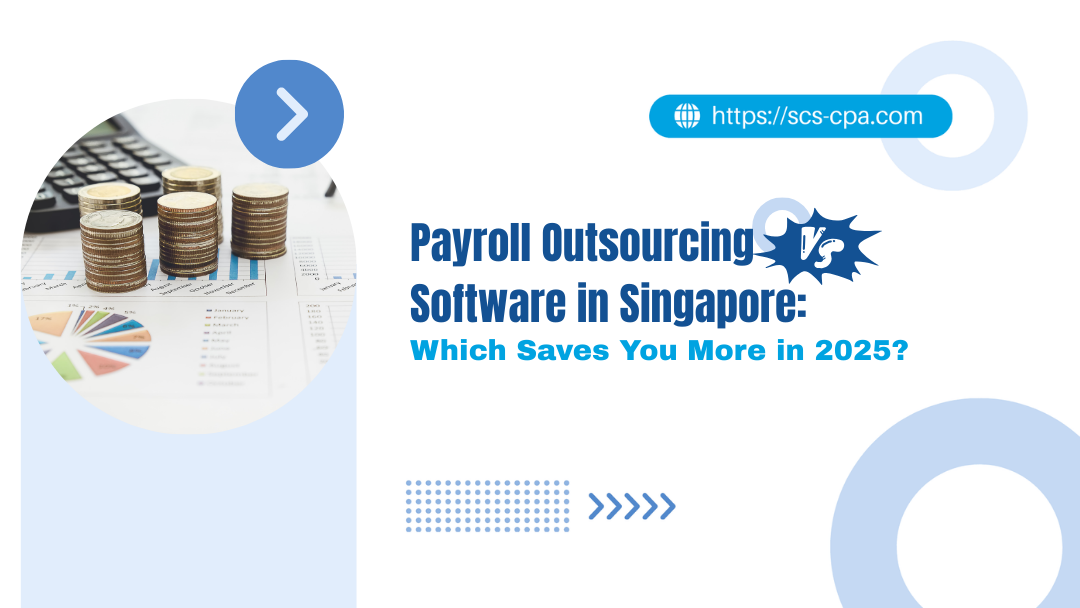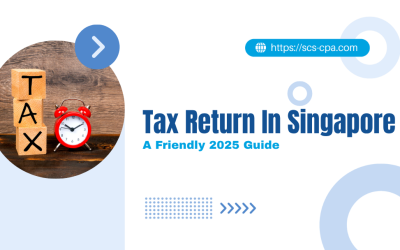
Payroll is one of those critical business functions that must be flawless every pay cycle, every employee, every time. Moreover, Singapore has many rules business owners may follow, including MOM regulations and CPF Contributions. So, how does one go through the complicated terrain? By considering the most suitable option: Payroll Outsourcing vs Software
In this guide, we will explore both options from various aspects. Then, we will guide you to choose the best solution for 2025.
Payroll Outsourcing: What It Is and How It Works

What are outsourcing payroll services?
Payroll outsourcing means hiring an external provider to manage your entire payroll process. Either a specialised firm or bureau. These experts offer a full range of services, including
- salary calculation,
- CPF, SDL, IRAS submissions,
- leave tracking, and
- payslip distribution.
It allows businesses to rely on third-party expertise rather than internal teams.
How outsourced payroll services operate in Singapore
To begin, your provider collects relevant employee data from you. Then, they use their internal systems to complete payroll tasks. Among them are
- computing pay and statutory contributions,
- filing returns like IR8A or CPF, and
- issuing payslips. Reporting is delivered based on your schedule.
Furthermore, they may support audit-ready records while ensuring you meet Singapore’s evolving regulations.
Payroll Software: The In-House Alternative

What is payroll software?
Payroll software refers to digital tools that help you compute wages, generate reports, and file statutory documents. These tools range from cloud-based platforms to locally installed systems. Additionally, they can be integrated into your existing HRIS or accounting systems, forming part of a streamlined payroll strategy.
How payroll software solutions function
Your team inputs data such as attendance, leave, and allowances. The software then automates pay calculations, CPF submissions, IR8A forms, and payslip generation. Many cloud tools update automatically for IRAS rate changes. Yet, some on-premise systems may need manual installations or patches.
Payroll Outsourcing vs Software: Cost Comparison
1. Hidden or Additional Fees

Payroll Outsourcing
You typically pay a monthly or annual service fee for payroll runs and compliance. As part of the subscription, your provider covers training and software updates. For large operations, this option simplifies budgeting and reduces indirect expenses.
In contrast, smaller teams may feel the pinch from the flat fee. This is because potential setup or onboarding costs can further increase their expenses beyond their tight budget.
Payroll Software
Payroll software comes with a license or subscription fee, either monthly or yearly. Your initial investment may involve software purchases and hardware, especially for on-premise systems.
SMEs may find software more cost-effective because they can purchase it based on their needs. Although you may incur more expenses as users or modules are added. Additionally, you may also need to pay for maintenance, updates, or vendor support.
2. Expertise, Risk, and Compliance Costs

Payroll Outsourcing
When you engage a provider, you will connect with their payroll and tax experts. These professionals are familiar with Singapore regulations, reducing your compliance risks.
Moreover, your provider manages all your documentation and records. The lesser the need for in-house expertise, the lower the errors and training costs.
Payroll Software
Payroll software is a tool you use, not a trained professional. So, you are responsible for compliance and updates. Some vendors offer automatic updates, but internal oversight is still necessary.
One downside to payroll software is the higher risk of error. If your staff are not trained or you missed an update, you can face penalties for any mistakes that occurred.
3. Setup and Implementation Costs

Payroll Outsourcing
The provider manages the setup and typically offers onboarding support. Their expertise allows them to build your system accurately and ensure it operates smoothly before you take over. This reduces the workload for your IT team.
If your payroll structure is complex, you might face a longer onboarding process. You may also need to work closely with your provider for the correct setup.
Payroll Software
Implementing in-house software requires full involvement. During the initial setup, your IT department installs and configures the system. They are also responsible for training your payroll team and maintaining the system.
Although this approach demands more time and resources, it offers greater flexibility. You can mould your system accordingly right from the foundation itself.
4. Customisation and Reporting Costs

Payroll Outsourcing
Outsourced payroll providers use standard processes to ensure consistency across the board. This standardisation leads to less direct control and limited room for customisation.
However, this solution can restrict your access to real-time information. This means that extra steps may be required before obtaining the reports you need.
Payroll Software
With payroll software, you have complete control of its workflows and data. The software is highly customisable to suit your unique business needs.
Need real-time reporting and full system access? They are immediately available at your fingertips.
5. Security, Privacy, and Integration Costs

Payroll Outsourcing
Specialist providers manage all your payroll data. Part of their tasks involves maintaining secure systems and meeting Singapore’s data protection laws. Amidst the expertise, remember to assess and manage the risk of third-party breaches.
Payroll Software
Your internal IT setup (or chosen cloud provider) is your first line of defence. This is because all policies and data management lie within your control. To keep all sensitive information safe, you must invest in cybersecurity systems.
6. Support and Troubleshooting Expenses

Payroll Outsourcing
A professional support team and employee helpdesk are available for support. This means that you have access to valuable expertise for the best solutions.
Yet, you have limited control over immediate fixes or custom troubleshooting. While helpdesks are available, they may need more time to reach out and assist you.
Payroll Software
Support varies based on the vendor plan and may include chat, phone, and training options. Furthermore, staff training and internal support are required.
Although you can make immediate changes within the system. Should issues arise, you and your team will be the first ones to respond to them.
Payroll Outsourcing vs Software: Which Option Suits Your Business?
|
Best Payroll Option |
Business Profile |
Why |
|
Payroll Outsourcing |
Medium to Large Companies with Complex or Multi-Region Payrolls |
Gain access to experts, reduce the compliance burden, and manage complexity effectively. |
|
Payroll Software |
Small to Medium Businesses with Simple Payroll Needs |
More budget-friendly, customizable, offers real-time control, and scales with business growth. |
More readings:
- Complete Guide To Payroll Services: What, How And Why
- 5 Helpful Features Payroll Services Bring To Your Business
Payroll Outsourcing vs Software: More FAQs
- Which saves more: outsourcing or software?
It depends on your company’s size and complexity. Software often costs less for small teams as its prices are based on features. Meanwhile, outsourcing can reduce compliance risks and internal costs for larger or more complex organisations. - Is outsourcing better for compliance in Singapore?
Yes. Outsourcing provides access to experts who ensure accurate compliance with IRAS, CPF, SDL, and MOM regulations. - What about data security concerns?
Outsourcing firms invest heavily in data security infrastructure. With software, the responsibility falls on you, so it is important to invest in strong cybersecurity measures. - How long does implementation take for each?
Outsourcing typically involves a faster onboarding process with your provider’s support. Software setup can take longer due to internal configuration and training. - Can I switch from software to outsourcing easily?
Yes, it is possible. However, you will need to export payroll data and align your processes with the new provider’s system. For a smoother transition, choose a provider that offers migration support.
If this is your first time engaging with a provider, read this article for tips on choosing the right one.
Payroll Outsourcing vs Software: Takeaway and Recommendation

Handling payroll requires precision, local compliance, and cost-effectiveness. Payroll software offers great value for small to medium businesses with straightforward payroll needs. In contrast, medium to large enterprises with complex operations benefit from the expertise of payroll outsourcing.
That being said, the best option depends on your internal resources, complexity and business plans. Before you commit to one, always evaluate your needs and priorities. You can also connect with an expert like SCS to better understand both approaches.
Disclaimer: The information provided in this article is intended for general guidance only and reflects regulations as of the publication date. Given that compliance requirements, processes, and fees may change over time, readers are advised to consult official sources such as ACRA for the most up-to-date information or seek professional guidance from our team
Still Unsure? Talk to a Payroll Expert
Looking for guidance?
Connect with SCS Payroll Experts to simplify payroll,
improve compliance and reduce costs.
Corporate Income Tax Malaysia: Rates, Filing, and Strategic Compliance
Understand Malaysia’s corporate income tax system. Learn current tax rates, SME tiers, filing deadlines, LHDN requirements, penalties, and more.
Understanding the Core Types of Audits and Their Roles in Accounting in Singapore
Learn the key types of audits in Singapore to build trust and stay compliant. Examples are statutory, internal, GST, and forensic.
Tax Return In Singapore: A Friendly 2025 Guide
Want to be a responsible business owner? Read this guide to tax return in Singapore to help understand tax filing and play your part.



